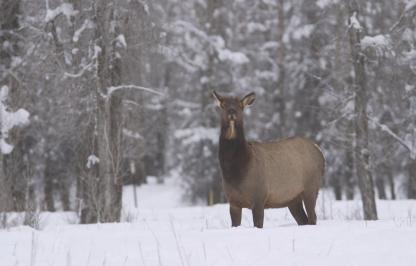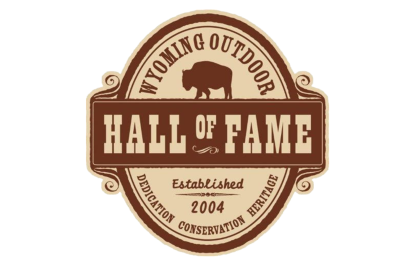Sage grouse lek attendance remains steady
Sage grouse lek attendance remains steady according to data from the Wyoming Game and Fish Department lek counts this spring. In 2022, lek attendance was up slightly at 6% over last year. The appearance of more birds at leks is thought to be due to the natural population cycles of sage grouse combined with good moisture that benefited habitat.
This spring, officials counted an average of 17.9 male sage grouse per active lek. Over 16,740 peak male sage grouse were observed on 87% of known, occupied leks. Annual counts are carried out by Game and Fish, Bureau of Land Management, consultants and volunteers. Birds are counted either aerially or on the ground through observations from a distance during their spring mating.

“The moisture was a welcome boost for sage grouse — drought conditions affected over-summer chick survival last year, which in turn influenced the population,” said Nyssa Whitford, Game and Fish sage grouse/sagebrush biologist. “This year, improved habitat conditions contributed to helping sage grouse populations stabilize.”
Habitat is key to the sustainability of sage grouse and is underscored in times of drought. Sage grouse are a sagebrush obligate species and could not survive without the plant.
“Sage grouse cannot thrive if the sagebrush habitat is fragmented and in poor condition. Wyoming continues to invest significantly in efforts to conserve sage grouse habitat,” Whitford said. “Habitat projects that build resiliency in the ecosystem are a priority.”
Game and Fish also monitors the percentage of known active and inactive leks throughout Wyoming. A lek is considered inactive if no birds or signs of strutting are observed under ideal conditions during mating season. Active leks remain steady at 75.6%.
Game and Fish data on sage grouse lek attendance goes back nearly six decades and charts the cyclical nature of the bird’s population.
“Sage grouse populations rise and fall,” Whitford said. “Studies indicate Wyoming’s population cycles every six to eight years. So, we were pleased to see a slight increase this year and anticipate seeing more in the years to come.”
The cause of these well-established cycles is not understood, but it is thought to be influenced by weather and climate, which in turn impacts the availability of food and cover in the sagebrush ecosystem. The Wyoming sage grouse populations hit an all-time low in the early 1990s following an extended drought and loss of habitat.
Game and Fish manages the bird to recognize the natural rises and falls. Part of that management includes a conservative hunting season that undergoes thorough review annually and a process where the public can provide comments.
Information from hunters is an important aspect of monitoring sage grouse populations. Annually, hunters are asked to drop wings from their harvested grouse into barrels for analysis.
“Hunter-submitted wings are one tool Game and Fish uses for sage grouse population monitoring. This fall, we are again asking for hunters to give us wings from harvested sage grouse,” Whitford said.
Another important piece of information for population monitoring is hunter surveys. Traditionally, sage grouse hunters were surveyed each spring as part of a larger survey to quantify the harvest of all upland game birds, migratory game birds and small game. This year, Game and Fish will conduct a separate survey of sage grouse hunters.
“Specifically surveying sage grouse hunters will give the department more direct and timely information to inform management decisions,” said Jason Carlisle, quantitative biologist in the Game and Fish Science, Research and Analytical Support Unit.
Sage grouse hunters can expect surveys shortly after the hunting season concludes.
This spring, officials counted an average of 17.9 male sage grouse per active lek. Over 16,740 peak male sage grouse were observed on 87% of known, occupied leks. Annual counts are carried out by Game and Fish, Bureau of Land Management, consultants and volunteers. Birds are counted either aerially or on the ground through observations from a distance during their spring mating.
“The moisture was a welcome boost for sage grouse — drought conditions affected over-summer chick survival last year, which in turn influenced the population,” said Nyssa Whitford, Game and Fish sage grouse/sagebrush biologist. “This year, improved habitat conditions contributed to helping sage grouse populations stabilize.”
Habitat is key to the sustainability of sage grouse and is underscored in times of drought. Sage grouse are a sagebrush obligate species and could not survive without the plant.
“Sage grouse cannot thrive if the sagebrush habitat is fragmented and in poor condition. Wyoming continues to invest significantly in efforts to conserve sage grouse habitat,” Whitford said. “Habitat projects that build resiliency in the ecosystem are a priority.”
Game and Fish also monitors the percentage of known active and inactive leks throughout Wyoming. A lek is considered inactive if no birds or signs of strutting are observed under ideal conditions during mating season. Active leks remain steady at 75.6%.
Game and Fish data on sage grouse lek attendance goes back nearly six decades and charts the cyclical nature of the bird’s population.
“Sage grouse populations rise and fall,” Whitford said. “Studies indicate Wyoming’s population cycles every six to eight years. So, we were pleased to see a slight increase this year and anticipate seeing more in the years to come.”
The cause of these well-established cycles is not understood, but it is thought to be influenced by weather and climate, which in turn impacts the availability of food and cover in the sagebrush ecosystem. The Wyoming sage grouse populations hit an all-time low in the early 1990s following an extended drought and loss of habitat.
Game and Fish manages the bird to recognize the natural rises and falls. Part of that management includes a conservative hunting season that undergoes thorough review annually and a process where the public can provide comments.
Information from hunters is an important aspect of monitoring sage grouse populations. Annually, hunters are asked to drop wings from their harvested grouse into barrels for analysis.
“Hunter-submitted wings are one tool Game and Fish uses for sage grouse population monitoring. This fall, we are again asking for hunters to give us wings from harvested sage grouse,” Whitford said.
Another important piece of information for population monitoring is hunter surveys. Traditionally, sage grouse hunters were surveyed each spring as part of a larger survey to quantify the harvest of all upland game birds, migratory game birds and small game. This year, Game and Fish will conduct a separate survey of sage grouse hunters.
“Specifically surveying sage grouse hunters will give the department more direct and timely information to inform management decisions,” said Jason Carlisle, quantitative biologist in the Game and Fish Science, Research and Analytical Support Unit.
Sage grouse hunters can expect surveys shortly after the hunting season concludes.
Sara DiRienzo, Public Information Officer - (sara.dirienzo@wyo.gov)




